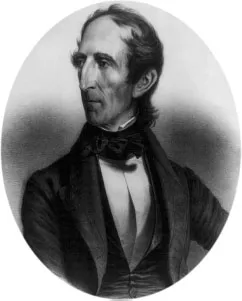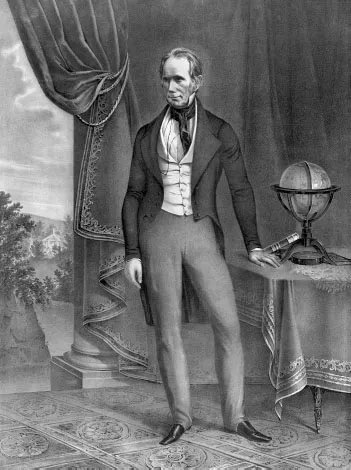![]()
CHAPTER 1
AN ACCIDENTAL PRESIDENT SEEKS A LEGACY
If the annexation of Texas shall crown off my public life, I shall neither retire ingloriously nor be soon forgotten.
—President John Tyler4
John Tyler’s presidency broke a good number of records. Just six days past his fifty-first birthday when he was sworn into office, he was the youngest man up to that time to become president. (This record would be short-lived. James Polk, Tyler’s successor, took the oath of office at the age of forty-nine.) Under Tyler’s watch, the first White House police force was organized. He was the first seated president to be widowed, and the first one to marry in the White House. “Hail to the Chief” was first used as the presidential anthem during his administration. Tyler had more children (eight when he took office, a full fifteen by the time he died) than any other chief executive. He was the first president to use a newfangled invention called the telegraph.
In the grand scheme of things, these “firsts,” while interesting to history buffs, don’t matter a whole lot. But two additional ones in Tyler’s presidency are far weightier because they are links in the chain of events that led to the fatal explosion on board the USS Princeton in 1844. One is that John Tyler was the first man to become chief executive following the death of an incumbent president. The other is that he was the first—and, to date, the only—sitting president to be expelled by the very party that took him to the White House.
Expelled by his own party and despised by Congress, President John Tyler sought a place in the history books by modernizing the navy and annexing the Republic of Texas. Library of Congress.
As the running mate of Whig candidate William Henry Harrison in the 1840 presidential election, Tyler was never intended by his party’s powerbrokers to be chief executive, nor did he himself appear to have anticipated the possibility that destiny might thrust him in that direction. This was astounding shortsightedness, given that Harrison was already an old man of close to sixty-eight years when he defeated incumbent president Martin Van Buren. In what shouldn’t have been much of a surprise to anyone, Harrison lasted only a month in office, dying of pneumonia in early April 1841. Tyler, who had returned to his Virginia home shortly after being sworn in as vice-president—he didn’t linger in Washington even to attend inaugural festivities—was hastily summoned back to the capital.
The Constitution wasn’t clear about whether the vice-president became president in fact or only acting president in the event of the chief executive’s death. The Twelfth Amendment, ratified in 1804, ambiguously stated that the “Vice-President shall act as President.” (The vagueness of “act” remained unresolved, by the way, until the 1967 ratification of the Twenty-fifth Amendment.) Tyler, who insisted on taking the oath of office as soon as he arrived in Washington, stubbornly held from the get-go that he was in fact the president of the United States. But he was hounded ever afterward by critics who questioned his authority. They reveled in calling him the “accidental president” or, worse, “His Accidency” and insisted on addressing their mail to “John Tyler, Acting President.” (Giving as good as he got, Tyler always refused to open such envelopes and promptly returned them to their senders.) From the very beginning of his term, then, Tyler’s administration fell under a cloud.
The other significant first in Tyler’s presidency was his expulsion from his own political party, the Whigs. This extraordinary event occurred in September 1841, when some fifty Whig congressmen gathered in front of the Capitol building to solemnly denounce and strip him of his party membership. Henry Clay, the Whig kingmaker who had counted on being the power behind the throne in a Tyler administration, bitterly condemned the president as a betrayer of Whig principles. “Our policy has been arrested by an Executive that we brought into power,” Clay said, and went on to compare Tyler to the perfidious and disgraced Benedict Arnold.5 Following Clay’s lead, Whigs across the nation burnt effigies of Tyler and indulged in purple recrimination. An editorialist for the Lexington Intelligencer, a newspaper in Henry Clay’s home state of Kentucky, captured their mood when he declared, “If a God-directed thunderbolt were to strike and annihilate the traitor, all would say that ‘Heaven is just.’”6
Tyler’s formal expulsion from the Whig party just five short months after he became president came on the heels of a couple other blows. Two days earlier, every member of his cabinet except Secretary of State Daniel Webster had resigned in protest—another first. Three weeks before that, angry and drunken mobs had gathered outside the White House, hurling insults as well as a few stones in the president’s direction. They were so threatening that in the days that followed, an alarmed Tyler asked Congress to establish the presidential police force that became the precursor of today’s Secret Service.
The immediate cause of the fury directed at Tyler was his veto of not one but two separate Whig bills. The Whig party, less than a decade old at the time, was founded by Henry Clay to promote a political agenda its supporters called the “American System.” Its central planks were high tariffs on imported goods to protect domestic manufacturers from foreign industry and federally funded “internal improvements,” such as the construction of canals and roads. But these policies required a strong federal legislative branch—not, the Whigs insisted, a strong executive one, as overly powerful presidents risked bringing tyranny to the republic—to regulate economic policy. They also required a strong national bank to standardize currency and watchdog investment. The two congressional bills that Tyler vetoed in the space of a single month both aimed to charter a national bank. Since Tyler was at least nominally a Whig, Clay and the other party members took these vetoes as betrayals of the American System and bitterly branded the president a turncoat.
Although Whigs felt blindsided by His Accidency’s rejection of a national bank, they really shouldn’t have. Anyone with even the slightest familiarity with Tyler’s background could have predicted his veto. He might have ridden to the White House on a Whig ticket, but he was anything but Whiggish in his political convictions.
Henry Clay of Kentucky, Whig leader and architect of the American System, despised President Tyler as a traitor to his political party. Library of Congress.
A SOUTHERN ARISTOCRAT
Tyler was born in 1790 into one of Virginia’s most prestigious tidewater families. His father was a judge, three-time governor of the commonwealth and close friend of Thomas Jefferson, Patrick Henry and James Madison. Tyler’s childhood was spent at Greenway, the family’s 1,200-acre estate worked by upward of forty slaves. Associates and friends of his father’s, most of them belonging to the Revolutionary generation, frequently visited Greenway. It was from listening to their table conversations that young Tyler absorbed the political principles that would sustain him for the rest of his life.
Tyler matriculated at the College of William and Mary when he was just twelve years old—not an unusual age for beginning college studies in those days—and graduated five years later with a love of ancient history and Shakespeare’s plays. After college, he moved to Richmond to read law. He was admitted to the Virginia bar in 1809 and launched his political career two years later when elected to the Virginia House of Delegates as a Democrat-Republican, the party of Thomas Jefferson.
When the War of 1812 erupted, Tyler signed on with the Williamsburg militia and was quickly appointed a captain. His outfit never saw combat, a fortunate turn of events given what seems to have been an embarrassing ineptitude for soldiering on the part of both the volunteers and their leader. In later years, Tyler himself often poked fun at what he sardonically called his “distinguished military services during the War of 1812.” But even though he was spared armed encounters with the enemy, British outrages during the war, particularly the pillaging of Hampton, Virginia, instilled in Tyler an abiding distrust of Great Britain. For the rest of his life, Tyler was certain that England’s growing world dominance posed a danger to the expansion of the United States’ geographical borders and international markets. This conviction would later lead to his presidential ambition to annex Texas and build a navy that would rival Britain’s.
In 1816, Tyler was sent by the people of his Virginia district to the U.S. House of Representatives, and for the next quarter century, he held public office almost continuously as a congressman, senator, governor and member of the Virginia House of Delegates. He acquired a reputation for integrity, seen by friend and foe alike as a legislator who followed his own incorruptible conscience rather than jumped on the latest political bandwagon or catered to powerful interest groups. That conscience, in turn, was informed by political ideals associated with fellow Virginians such as George Washington, Thomas Jefferson, James Madison and James Monroe: limited federal government, the supremacy of states’ rights and local governance and a strict interpretation of the Constitution. His aristocratic background also instilled in him a deep suspicion of the “common man,” and Tyler never allowed popular opinion to dictate either his political positions or legislative behavior.
Like his hero Jefferson, Tyler was also a lifelong slave owner and ambivalent defender of the South’s “peculiar institution.” As a congressman in 1820, he opposed the Missouri Compromise, legislation that prohibited the extension of slavery in U.S. territories north of the 36-30 parallel, claiming that it was an unconstitutional extension of federal authority. Instead, he defended then and to the end of his life a policy of opening up all U.S. territories to slavery, arguing that doing so would gradually “diffuse” or spread the slave population thin and hasten the institution’s demise. A bizarre theory, diffusion was nonetheless popular in the South during Tyler’s lifetime.
Tyler’s states’ rights–based interpretation of the Constitution became increasingly obvious after the 1828 election of Andrew Jackson to the presidency. Tyler had only reluctantly supported “Old Hickory’s” bid for the White House, seeing a victory for Jackson as less undesirable than the reelection of the incumbent John Quincy Adams. After all, Jackson claimed to be in the tradition of Jefferson’s Democratic-Republican Party, whose followers increasingly referred to themselves simply as Democrats. But it wasn’t long before what he saw as Jackson’s illegitimate expansion of presidential power made him think twice about his decision. The breaking point for Tyler came in 1832 during a standoff between Jackson and the governor and legislature of South Carolina.
The conflict, which became known as the Nullification Crisis, was sparked by South Carolina’s threat to ignore or “nullify” a federally mandated tariff on the grounds that it unduly penalized Southern manufacturers and consumers while benefiting Northern ones. Tyler was no defender of nullification, believing as he did that the Constitution nowhere granted citizens the right to disobey the law of the land. But he was scandalized when President Jackson responded by vowing to send an army to South Carolina and hang every nullifier he could lay his hands on. The individual states, Tyler believed, were sovereign powers, and Jackson’s high-handed effort to subordinate them to Washington—a process which Tyler disparagingly referred to as “nationality”—was unconstitutional. As he lamented on the Senate floor in 1833, “Everything is running into nationality. You cannot walk down the streets without seeing the word on every sign—National Hotel, National boot-black, National black-smith, National Oyster-house.” Nationality put sovereign states at risk of being reduced to the status of “mere petty corporations, provinces of one consolidated government.”7 But this, according to Tyler, was a reversal of the founders’ intentions. America was a compact of sovereign states. The federal government was their creation and their creature, not the other way around.
In the same year that Tyler gave his speech deploring “nationality,” President Jackson, whom Tyler and other critics had begun calling “King Andrew,” once again stretched his executive muscles by trying to destroy the Second Bank of the United States, chartered in 1816 as a relatively independent institution to oversee currency, credit and investments. Jackson’s pretext for dismantling the bank was that its operations were inefficient, its managers corrupt and its charter a violation of states’ rights—a rather surprising charge, coming as it did on the heels of his Nullification Crisis threat to hang supporters of states’ rights. When opponents such as Kentucky senator Henry Clay and John Tyler charged that the president was overstepping his prerogative, Jackson replied that his landslide reelection in the 1832 presidential campaign gave him a popular mandate to do pretty much whatever he wanted. Tyler, the anti-populist Southern aristocrat, disgustedly noted that King Andrew and King Mob rather than the Constitution now ruled the land. Tyler was no champion of a national bank, believing, in fact, that such an institution did unjustifiably interfere with the rights of states to regulate their own economies. He agreed with Jackson on that score. His opposition to the president’s anti-bank policy was based on his broader conviction that Jackson was overstepping the constitutionally defined powers of the executive branch. Accordingly, Tyler led a coalition of other disaffected senators in a successful bid to formally censure the president, something that hadn’t been done before in the nation’s history.
At the same time, Tyler increasingly moved away from the Democrats, with whom he’d always aligned himself but who now were Jackson men, and instead threw in his lot with the newly formed Whig party, whose members, while holding a variety of political views, were united by their opposition to Jackson. Democrats who remained Jackson loyalists targeted Tyler for payback, and they got their chance two years later. In the aftermath of state elections in the spring of 1835, Democrats won control of both houses of the Virginia assembly. The custom at the time dictated that federal senators representing Virginia took their instructions from state assemblymen. The new Democratic majority instructed Senator Tyler to vote to expunge the president’s censure. Tyler, believing that the order was unconstitutional, refused to obey the “villainous instruction” and resigned his Senate seat, just as the Democrats had anticipated he would. In his letter of resignation, Tyler stated his determination to be led by principle rather than party allegiance: “I shall carry with me into retirement the principles which I brought with me into public life…I shall set an example to my children which shall teach them to regard as nothing place and office, when either is to be attained or held at the expense of honor.” He recognized that leaving Washington in this way risked “doom[ing]” him to “perpetual exile from the public councils.” But if so, he said, “I am content.”8 When John Tyler left for Virginia shortly afterward, it was as a Southern aristocrat who refused to be bullied by either King Andrew or King Mob into betraying the Constitution.
TIPPECANOE AND TYLER TOO
Over seventy and in poor health, Andrew Jackson prudently decided not to seek a third term in 1836. Instead, he handpicked his successor: his vice-president, New York–born Martin Van Buren. The Whigs feared that if Van Buren were elected, four more years of Jacksonian policies would follow. So they determined to give him a run for his money.
The obvious choice for a Whig opponent was Henry Clay, the party’s founder. But Clay was already a two-time loser in presidential races, having made unsuccessful bids in 1824 and 1832, and party leaders were wary of giving him a third try. They also knew that anyone whom Jackson designated as his heir apparent would be a man hard to beat. So they settled on a unique strategy. They ran two different Whig tickets with candidates representing the North and the South. The hope was that a three-way race would fragment the national vote enough to deny Van Buren a majority. Under the terms of the Twelfth Amendment, this would throw the election to the House of Representatives, where the Whigs believed they had a fighting chance of swaying the outcome. Tyler was nominated as the vice-presidential candidate on the Southern ticket. His principled departure from Washington had enhanced rather than diminished his political cachet.
The strategy was clever but unsuccessful. Van Buren was victorious, although by a razor-thin margin of only thirty thousand popular votes. But things began to look up almost immediately for the Whigs, even if not for the nation. Shortly after Van Buren’s inauguration, the Panic of 1837 rocked the economy. It was the worst depression to hit the United States until the 1929 crash, and in its wake, dozens of banks failed, businesses collapsed, inflation ran in the double digits and unemployment skyrocketed as a full 90 percent of factories in the northeast shut their doors. As president, the Democrat Van Buren caught the heat for the economic cr...


